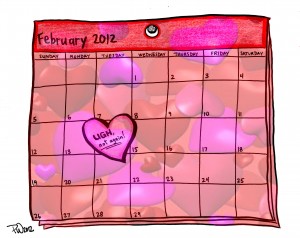We’ve all heard it before, Valentine’s Day is a ploy on the part of Hallmark and the candy companies to get us to spend vast amounts of money on their products under the guise that we’re doing it becaus
Yet we shake our heads and say that we know better, or say that Valentine’s Day is a transparent consumerist holiday and we won’t be suckered in. However, for some reason, the majority of us find ourselves bent over smelling roses, trying to pick the ones we think our partner will like, or desperately wracking our brains for something romantic to do. What is this power Feb. 14 holds over us? Why do we as a society continue to observe a holiday named for a saint of dubious origins and significance?
Doctoral candidate and Montreal therapist Stine Linden-Andersen, believes that Valentine’s Day can play an important role in the relationship of a couple. “It can be important for courting, to show a partner how romantically inclined they are, to solidify the relationship. As a relationship matures, it gets used a bit differently, some couples will choose to do small things and some will choose not to do anything at all because it has become too commercialized and doesn’t set them apart as a couple.”
But does that make it an obligation? One Concordia student, who wished to remain anonymous, says that he only participates in Valentine’s Day because it’s what his girlfriend wants and expects of him. However, Dylan Stansfield, a creative writing and psychology student at Concordia, said that he relishes the opportunity to do something special for the person he cares about. “It’s something that’s fun if you’re in a relationship. It’s fun to celebrate that you’re with someone,” he said.
It would seem that the onus is on the men to plan something or come up with a present that’s significant. Creative writing student Lexie Comeau celebrates Valentine’s Day for the love of celebrating in general. “I think any reason to celebrate is a good one,” she explained, and feels that the onus is on the person who wants the celebration to occur to plan an event or buy a gift. “I think it should be whoever wants to take the initiative.”
According to a survey of 2,003 adults by American Express Spending & Saving Tracker, men are willing to spend more than women on Valentine’s Day. Men are willing to spend up to $151, whereas women are only willing to spend up to $114. Close to 48 per cent of women said they were not going to buy anything for their significant other at all.
Why is this? Aren’t we supposed to be in an age of equality between men and women? Are men spending as a result of societal obligation or does it stem from a personal desire?
Linden-Andersen said that often times in young relationships, men feel obligated to demonstrate just how much they care for their partner and Valentine’s Day is a crucial opportunity for doing so. In the LGBT community, Michael Filion, a political science student in Concordia, feels that things are mostly equal, unless previously discussed. “Especially in the gay world, it’s very common to feel almost like this equality has to be maintained. If not, there’s a male-female balance to it. If these gender roles have been established within the relationship, the one who has taken the male dominated role must be the one who pays. Otherwise, the majority of what I’ve noticed is there’s always an equality that’s trying to be matched,” he said.
In any relationship, whether it is brand new or several years old, Valentine’s Day is a good opportunity to open the lines of communication and establish the expectations each person has about this day. Linden-Andersen suggests talking about it lightly and with humour in order to get a better idea of how to celebrate in a way that is convenient for both partners.
She suggests asking leading questions such as “Have you ever been surprised?” and “What have you done before that you liked?” Most importantly though, she says to remember “the way couples celebrate Valentine’s Day is not an indicator of their relationship.” Which means that just because you don’t make a big deal about Feb. 14 does not mean that your relationship is without romance. “You don’t really tell someone you love them only once a year, but it’s an occasion to publicly acknowledge it in a way,” said Donald Boisvert, a professor of religion at Concordia. “It’s like Christmas, there’s always a bit of an obligation. There’s a commercial element that we don’t really want to acknowledge we’re buying into. It doesn’t mean that because it’s commercially focused, people’s feelings aren’t genuine.”
Whether you choose to celebrate Feb. 14 as a special day, or whether you choose to dismiss it as capitalist hogwash, if there’s someone special in your life, we can all agree that you shouldn’t be expressing how you feel about them only once a year.
Concordia Arts students collaborate to produce a brand-new exhibit out of a recycled one
The students of the special topics art course ARTT 399 get a hands-on learning experience about sustainability in…




